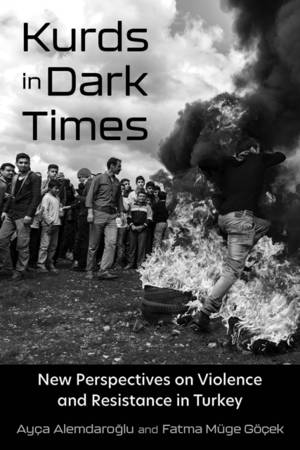
Door een staking bij bpost kan je online bestelling op dit moment iets langer onderweg zijn dan voorzien. Dringend iets nodig? Onze winkels ontvangen jou met open armen!
- Afhalen na 1 uur in een winkel met voorraad
- Gratis thuislevering in België vanaf € 30
- Ruim aanbod met 7 miljoen producten
Door een staking bij bpost kan je online bestelling op dit moment iets langer onderweg zijn dan voorzien. Dringend iets nodig? Onze winkels ontvangen jou met open armen!
- Afhalen na 1 uur in een winkel met voorraad
- Gratis thuislevering in België vanaf € 30
- Ruim aanbod met 7 miljoen producten
Zoeken
Kurds in Dark Times
New Perspectives on Violence and Resistance in Turkey
Metin Atmaca, Janet Klein, Baris Unlu, Michael Ferguson, Gullistan Yarkin, Deniz Duruiz, Sefika Kumral, Ali Keles
€ 72,95
+ 145 punten
Uitvoering
Omschrijving
With an estimated population of 35 million, Kurds are the largest ethnic group in the world without an independent state of their own. Kurds constitute about 20 percent of Turkey, the largest Kurdish population in the region. The history of the Kurds in Turkey is marked by state violence against them and decades of conflict between the Turkish military and Kurdish fighters. Although the continuous struggle of the Kurdish people is well known, and the political actors involved in the conflict have received much attention, an increasing wave of scholarship is being written from the vantage point of the Kurds themselves.
Alemdaroglu and Göçek's volume develops a fresh approach by moving away from top-down Turkish nationalist macroanalyses to a microanalysis of how Kurds and Kurdistan as historical and ethnic categories were constructed from the bottom up. Contributors look beyond the politics of state actors to examine how Kurdish workers, women, youth, and political prisoners experience and resist marginalization, exclusion, and violence. Kurds in Dark Times opens an essential window into the lives of Kurds by generating meaningful insights into the formal and informal ways of negotiating their power and place in Turkey; and therefore, it provides crucial perspectives for any endeavor to create peace and reconciliation in the country.Specificaties
Betrokkenen
- Auteur(s):
- Uitgeverij:
Inhoud
- Aantal bladzijden:
- 432
- Taal:
- Engels
- Reeks:
Eigenschappen
- Productcode (EAN):
- 9780815637806
- Verschijningsdatum:
- 3/01/2023
- Uitvoering:
- Paperback
- Formaat:
- Trade paperback (VS)
- Afmetingen:
- 152 mm x 229 mm
- Gewicht:
- 653 g

Alleen bij Standaard Boekhandel
+ 145 punten op je klantenkaart van Standaard Boekhandel
Beoordelingen
We publiceren alleen reviews die voldoen aan de voorwaarden voor reviews. Bekijk onze voorwaarden voor reviews.











